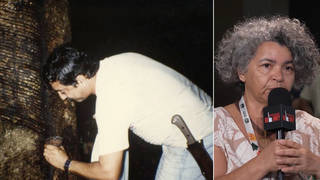In Canada, the ruling Liberal government has been voted out of office after 12 years in power. The Conservative Party’s Stephen Harper will be the country’s next Prime Minister. “I just telephoned Steven Harper and I offered him my congratulations. The people of Canada have chosen him to lead a minority government. I wish him the best. We differ on many things, but we all share a belief in the potential and the promise of Canada, and the desire in our country to succeed,” said Canadian Prime Minister Paul Martin. Several analysts called the Conservatives’ election less a signal of a rightward tilt in Canadian society than a reflection of general frustration against the ruling Liberal party. The Liberals have caught headlines for a series of government corruption scandals. Conservative Party leader Stephen Harper later spoke last night. “One of the oldest and most enduring Canadian values is democracy. The principle that we can change our government without risking our freedom and our lives,” Harper said. “Despite the divisions and discords of an election, the ability to peacefully change and renew our nation’s leadership remains one of our countries great strengths.” Harper has said he’ll reconsider Canada’s refusal to join the US’ ballistic missile shield program and its signatory status to the Kyoto accords. But Harper’s powers will be limited, however, by his party’s failure to secure a majority government. Among the high-profile government officials with the ruling Liberal government to lose their seats was Canada’s Foreign Minister, Pierre Pettigrew. Pettigrew lost his seat representing Montreal following an unprecedented campaign from members of the city’s Haitian community against his re-election. As Foreign Minister, Pettigrew led Canadian policy in Haiti. The Canadian government has come under increased scrutiny amid criticisms it backed the overthrow of Haitian President Jean Bertrand-Aristide and has supported human rights abuses committed by the Haitian National Police.
Hi there,
For nearly 30 years, Democracy Now! has reported on the silenced majority fighting to end war, authoritarianism, environmental destruction, human rights violations, immigration crackdowns, and so much more. Next Tuesday, December 2nd, is Giving NewsDay (independent media’s spin on Giving Tuesday). Thanks to a group of generous donors, donations made today through Giving NewsDay will be TRIPLED, which means your $15 gift is worth $45. Please donate today, so we can keep bringing you our hard-hitting, independent news.
Every dollar makes a difference. Thank you so much.
Democracy Now!
Amy Goodman
Hi there,
For nearly 30 years, Democracy Now! has reported on the silenced majority fighting to end war, authoritarianism, environmental destruction, human rights violations, immigration crackdowns, and so much more. Next Tuesday, December 2nd, is Giving NewsDay (independent media’s spin on Giving Tuesday). Thanks to a group of generous donors, donations made today through Giving NewsDay will be TRIPLED, which means your $15 gift is worth $45. Please donate today, so we can keep bringing you our hard-hitting, independent news.
Every dollar makes a difference. Thank you so much.
Democracy Now!
Amy Goodman
Non-commercial news needs your support.
We rely on contributions from you, our viewers and listeners to do our work. If you visit us daily or weekly or even just once a month, now is a great time to make your monthly contribution.
Please do your part today.
Most popular
- 1
- 2
- 3
- 4
Non-commercial news needs your support
Please do your part today.










